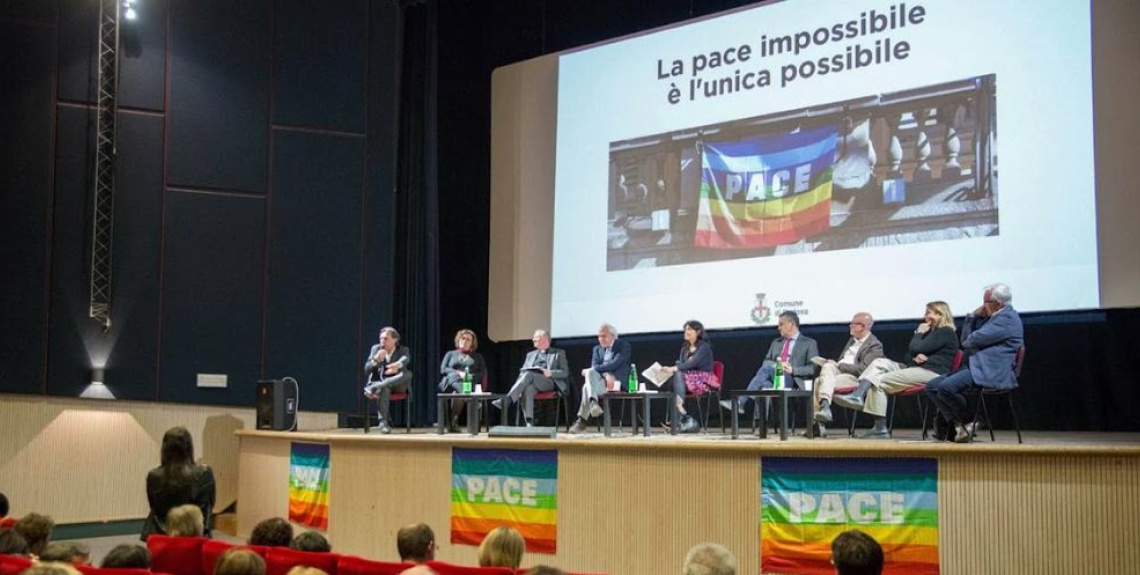In the wake of the European initiative "Peace can win the war" - calling for a ceasefire in Ukraine and around the world - the City of Padua gave impulse to a collective reflection on peace with its inhabitants.
The City of Padua has been committed to peace, nonviolence and human rights for decades, thanks to its active social fabric; and to the initiatives of the several civil society organisations and the University Center for Human Rights, which were strongly supported by the City. The direct involvement of the City Council in these peace initiatives and the setup of a municipal department with a political mandate dedicated to peace and human rights testify the sensitivity of the community and the institutional commitment of Padua on these issues. At a public meeting held last April, the City initiated a dialogue between institutions, academics, representatives of labour organizations, civil society associations, religious organisations, and local and national networks engaged in the fight against war entitled "An Impossible Peace is the Only Possible Peace." Ms. Francesca Benciolini – Deputy Mayor for peace and human rights of the City of Padua - opened the event by recalling the several ongoing conflicts around the world.
Ms. Francesca Benciolini reiterated the key role of Local and Regional Governments and local associations to promote activism and cooperation on human rights and peace, going beyond the national debates on rearmament and the growing political polarisation triggered by conflicts, especially by the war in Ukraine. Ms. Benciolini also stressed the importance of scaling-up the action of the local community and the need of bringing the questions and requests raised by the citizens into a structured reflection “as a City” on war and peace. This reflection aims at listening and involving different stakeholders of Padua into a dialogue to understand the complexity of the social and political causes and processes that lead to peace or war; as well as to outline common tools to build transformative path towards peaceful communities.
During the exchange, some of the participants highlighted that the conflicts in Yemen, Syria, Libya, Afghanistan, Iraq, South-Sudan, etc., have led to the idea that peace is unraveling worldwide, and that “war” has become the main category used to understand global events. The role of diplomacy and dialogue – often promoted by Local Governments– was overshadowed by other national priorities on rearmament and military aid. In this regard, some representatives of CSO affirmed that war is always choice, and that no war has ever stopped because weapons were sent. On the contrary, cities and civil society have often been able to join forces to foster proximity with the population affected by conflicts through humanitarian aid and decentralized cooperation, by looking “for what unites and put aside what divides” and promoting a different model of city diplomacy which goes beyond the absence of war.
Very often, in fact, the delivery of humanitarian aid is a responsibility of the third sector, which operates in close cooperation with local and regional authorities, at least in the Italian context. In Bosnia, during the conflict in the Balkans, the action of civil society and Local Governments represented a powerful example of international solidarity and “people’s diplomacy” to help civilians through physical proximity and dialogue; as well as by bringing humanitarian aid and mobilising funds at local level, showcasing that “it is easier to foster peace by building hospitals than by sending weapons”, as a representative of the ONG Emergency affirmed.
Representatives of the labour organisations and academia recalled that war is as threat to social and civil rights, and is the result of a culture of inequality and an increasing de-responsabilisation of politics, which is unable to govern complex processes through social policies. This crisis of the welfare state exacerbates poverty; and war exacerbates inequalities. In this regard, Local Governments play an important role to bring back a culture of peace, equality and social justice in the political agenda, by fostering dignity for all and democracy through active citizenship and proximity.
Representatives from local and national networks on peacebuilding also emphasized that cities should not only be concerned with the administration of city’s assets and goods; but also, with the care and wellbeing of citizens by applying a holistic perspective on service provision. Indeed, war also affects climate, health and the youth. Investing in education and involving local educational institutions in peace initiatives is thus key to train a new generation of “peace builders” and to understand that peace – just like war – is a process; that has to be part of the institutional discourse and of the multilateral system.
The meeting concluded with a speech by the Assessor who reminded that peace is a conscious choice of individuals and communities. Peace and dignity need education, dialogue, peer-to-peer learning and cooperation. In this sense, amplifying the voice of Local and Regional Governments at national and international levels is essential to scale-up the joint efforts of different actors of cities and territories worldwide towards the construction of peace.
For more information about the initiative and the work on peace of the City of Padua, please contact the Padua’s Rights and Participation Office at the following email: [email protected]


